Boardroom Premium
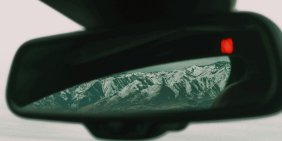
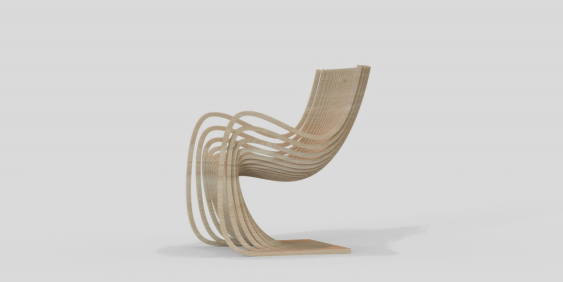
As a Pacific trailblazer in ergonomics, Dr Kolose is shaping safer workplaces through board leadership.
OPINION: My governance journey began in 2023 when I was nominated as Chair of the Human Factors and Ergonomics Society of New Zealand (HFESNZ), which had a snowball effect where I was invited to join other boards specialising in Pacific health and safety (Pasifika Health and Safety Advisory Leadership Group), education (Westlake Girls High School) and other steering and advisory groups for the regulator.
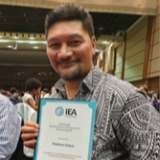
Dr Stephven Kolose
My interest in governance grew from a desire to influence decisions that directly impact Pacific workers. Having worked as a researcher for more than 15 years, no matter how great your project is, the final decision – whether to start or implement its recommendations – rests with boards, trustees or directors.
New Zealand is lucky to have fantastic Pacific representation in health and mental health boards, but not so much in health and safety. Pacific health and safety professionals do exist, but it’s even more important to have representation at board level in that influence sphere.
Research consistently shows Pacific workers face disproportionately high workplace injury rates. However, solutions are scarce, often because research fails to capture what uniquely makes us “Pacific”. As a board member, I aim to bridge this gap, advocating for safer workplaces so our people can enjoy prolonged, injury-free careers and return home safely to their families.
My passion and fascination for human factors and ergonomics (HFE) stemmed from a third-year cognitive psychology paper at the University of Otago. It got me really interested in human error and how the work environment can affect human/user performance, cognition, health and safety and decision-making in airplane cockpits. In the real world, I saw how a sub-optimal work environment or processes can take a physical and mental toll on workers.
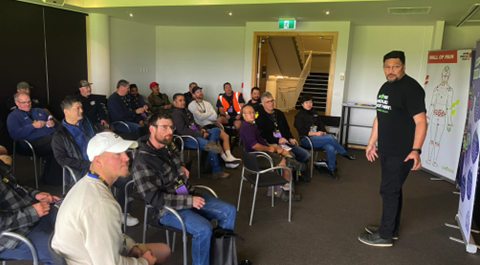
Dr Kolose presents ergonomics advice to builders in Auckland as part of CHASNZ
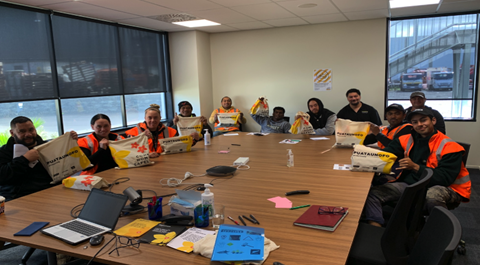
Dr Kolose shares manual handling advice to Pacific workers as part of the Pasifika Health and Safety Leadership Advisory Group
Growing up, my father was a perfect example. He worked for more than 40 years as a shift working labourer. As a child, I remember seeing him come home at 3am, tired with various aches, pains and strains. While he said he was fine, his face and body language were completely the opposite. This memory has stayed with me because kids notice these things. It’s not until we are adults that we understand the sacrifices their frail bodies have made for us to survive, grow and, most importantly, thrive. Unfortunately, this is a common story in so many hard-working Pacific families where work-related pain is accepted, and often secondary to commitments to family and the church.
It was also a noticeable pattern when I worked as a tertiary student in the meat works, cheese factory and landscaping jobs where I saw hard working people who carried obvious ailments but kept pushing through the pain to make ends meet. I wanted to change this and commit to a career that helps people and, ultimately, their families.
Fast forward 25 years, my fascination in helping workers has taken me around the world and led to a rewarding career as an HFE professional where I have had an opportunity to share Pacific injury-based research to the world. This includes as a keynote speaker at the HFESA Annual Conference in Melbourne, and this month, I will be a keynote speaker at a national conference in Malaysia speaking specifically about Pacific worker injuries in New Zealand and what other cultures can learn from it. A lot of my research has also covered musculoskeletal disorders, such as gout, which is very prevalent in Pacific workers.
As the only Pacific ergonomist globally, I’ve been honoured to share our injury-based research worldwide, earning international recognition such as the International Ergonomics Association 2023 Kingfar Research Award and the NATO Shared Scientific Excellence Award. These milestones fuel my commitment to reducing workplace injuries for Pacific workers.
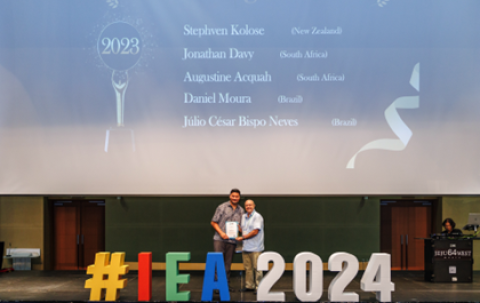
Dr Kolose received the 2023 IEA/Kingfar Award, which was presented at the IEA Congress on Jeju Island, South Korea
Outside of my supportive family, I would not have achieved this success. I was also fortunate to have strong role models and mentors who put me on their shoulders – none of them were Pacific but they saw value in my work ethic and my potential.
Today, I want to use my experiences to encourage Pacific people, whether they are scholars or salt of the earth labourers – to give their dreams a shot, no matter how culturally “alone” they feel or how difficult their profession or trade. I believe that all Pacific peoples have “pioneering” genes in their DNA – we just need the right mentors to help bring that out.
From a governance perspective, through sharing my experiences and education at board level, I want boards to understand the ‘human element’ of our decision making, not profits or reputational damage. Hence, why I am a “human” factors and ergonomics professional.
I applied for the Tautua Pasifika Mentoring Programme because I wanted to learn from fellow Pacific directors and increase my knowledge of governance. I am still relatively new to it, despite being on a couple of professional associations and education boards. In the first instance, I found out about the programme through our CEO Chris Alderson at CHASNZ who saw the advertisement on LinkedIn and asked if I wanted to apply, and that he would fully support my application/decision. This gave me all the confidence to throw my hat in the ring.
Prior to applying, I did my research (as you do), on all the mentors for the programme, their roles, experiences, and background, and there were so many amazing mentors from diverse fields, so I thought it would be a privilege to have any one of them. One mentor had extensive and distinguished governance experience in health and safety – George Adams CFInstD, who was someone I hadn’t heard of before. And from that point, I did my homework and asked my colleagues (who were also his acquaintances) whether his background would align with my governance goals.
As it turns out, George is an absolute superstar in the governance space in health and safety, so I customised my application and submitted it.
When I didn’t hear back initially, I assumed another deserving Pacific director got the spot – a win for our community! But receiving the acceptance email was a humbling Christmas gift, which I celebrated with my family.
A few weeks later, an email came out asking for qualities that we wanted in a mentor to facilitate mentee/mentor compatibility, so I cut to the chase and asked for George, and the rest is history.
I am so thankful for this opportunity from the IoD and my mentor. Personally, it capped off a memorable 2024, which included obtaining national (Safeguard) and international (IEA) awards. I feel so blessed.
Dr Stephven Kolose is a proud Samoan (Matautu-Lefaga, Leauva’a), born and raised in Dunedin. He now lives in Auckland with his wife Gloria and their five children. Stephven is one of 10 mentees selected for the inaugural Tautua Pasifika Mentoring Programme – a platform for aspiring Pacific leaders seeking a future in governance. This is the first in a three-part blog series reflecting on his journey.